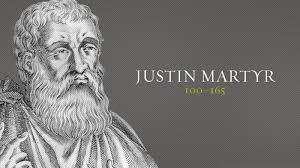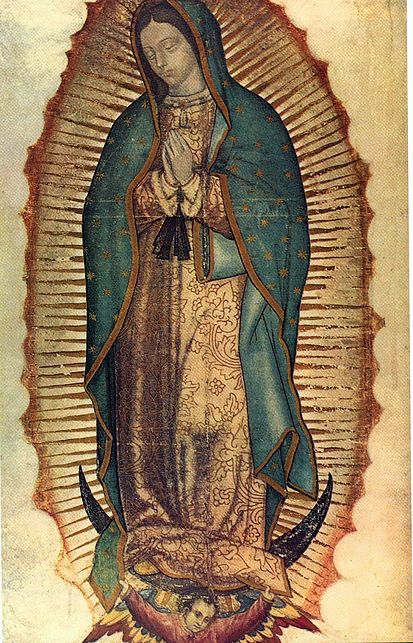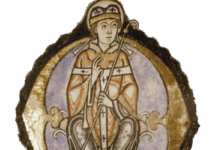Saint Justin (+165) who is called the ‘Martyr’, was born around the time the last Apostle, John, departed this life for heaven. Justin was not raised in the Catholic faith – few were in those incipient days of the Church – but was rather a pagan convert to Christianity. He first investigated the various philosophies of the age, Platonism, Socratic, Peripatetic, Stoic, Pythagorean, but none satisfied his desire for the ‘whole truth and nothing but…’.
It was a chance meeting with an old man, a Syrian Christian, who offered him the simplicity and coherence of the Catholic faith, which satisfied Justin’s desire for truth and beauty, and his mind and soul were made up. He entered the Church, receiving Baptism, and never looked back – It is from Justin’s pen that we have one of the earliest descriptions of the Holy Mass, in a letter to Antoninus Pius in around 155 A.D. (cf., CCC, #1345), along with much other evidence of the Church’s earliest – and already very ‘Catholic’ – traditions.
Justin adopted the life of an itinerant teacher, eventually starting a school in Rome, writing much, but the only treatises that survive are two dialogues and an ‘apology’; hence is called the first of the ‘apologists’, those who made an apologia for the Faith – a ‘reasoned defence’, not an apology in our modern sense – as Saint Peter exhorted us to do (1 Pet 3:15).
Justin saw the truth as dispersed throughout history like seeds, and that anyone who follows the truth as it was known to them – even the pagan philosophers of old – could be considered an ‘unwitting’ Christian. Salvation really is open to all, although easier with the more truth that one has. And, before we get too comfy with an easy interpretation of that, Justin would claim that one should move from ‘truth to truth’ as one proceeds in the spiritual life. As the Church’s constitution, Lumen Gentium, states:
Whosoever, therefore, knowing (non ignorantes) that the Catholic Church was made necessary by Christ, would refuse to enter or to remain in it, could not be saved (14)
Once one accepts the truth of Christ’s divinity, for example, then why not the Eucharist and the rest of the sacraments? Or the dignity of human life, and the prohibition of abortion? The ideal of married love, and striving for purity and chastity. And so on. In the end, all truths should lead one to ‘the universal truth’ found in the one, true Church.
Yet, as we have seen in our own houses of government, media, and influence, some seem blinded to the truth, perhaps deliberately so, shutting their eyes and ears so they cannot – or will not – see and hear. Rather than submit to the truth, they respond with violence. And so it was, after a dispute with the cynic philosopher Crescens, Justin was denounced to the authorities, and beheaded in 165 A.D., under the persecution of the Stoic emperor Marcus Aurelius.
The contemporary account of Justin’s trial and martyrdom makes for some visceral reading, as a bold and courageous witness to the Truth. Contrary to the ambiguous message of works like Silence, Saint Justin declared that he had no need to deliberate on whether to offer sacrifice to false gods, regardless of what inducements they offered, and that he would never give up his Faith.
Do what you will. We are Christians; we do not offer sacrifice to idols
He knew that philosophy has its limits, and that the Faith is more certain than any human science. Justin’s loss of his temporal life, giving all, even his very mind, to Christ, meant that he received it all back, a hundredfold.
The prefect Rusticus said: “Do you have an idea that you will go up to heaven to receive some suitable rewards?” Justin said: “It is not an idea that I have; it is something I know well and hold to be most certain.”
Amen. So have confidence, be of good cheer, and be not seduced by the world and its arguments. For the form of this world is passing away, but the truth abides forever.
May Saint Justin intercede for all those who know not this salvific truth, that they turn from their ways, and, respond to the grace that is give them.











